Photographs: Kevin Lamarque/Reuters Lalit K Jha in Washington
Demanding a "year of action," the US President called to close Guantanamo Bay prison and impose "prudent limits" on drones in State of the Union speech.
The United States will continue to focus on the Asia-Pacific region and shape a future of greater security, President Barack Obama said on Wednesday, even as he vowed to veto any Congressional bill imposing new sanctions on Iran to give "diplomacy a chance to succeed".
In his sixth annual address to the Congress, Obama touched upon various areas of the world, emphasising on key aspects of his foreign policy. There was no mention of India in his speech, wherein he cited China once in an economic context.
"We will continue to focus on the Asia-Pacific, where we support our allies, shape a future of greater security and prosperity and extend a hand to those devastated by disaster -- as we did in the Philippines, when our marines and civilians rushed to aid those battered by a typhoon, and were greeted with words like, 'We will never forget your kindness' and 'God bless America!'" Obama said in his annual State of the Union Address to the Congress.
Observing that in a world of complex threats, US' security and leadership depends on all elements of its power, Obama said American diplomacy has rallied more than fifty countries to prevent nuclear materials from falling into the wrong hands and allowed to reduce reliance on Cold War stockpiles.
"American diplomacy, backed by the threat of force, is why Syria's chemical weapons are being eliminated, and we will continue to work with the international community to usher in the future the Syrian people deserve -- a future free of dictatorship, terror and fear," he said.
…
'We must give diplomacy a chance to succeed'
Image: Obama talks with members of Congress as he departs after delivering his State of the Union speech on Capitol Hill in WashingtonPhotographs: Larry Downing/Reuters
Attributing the tough sanctions on Iran for bringing Tehran on the negotiations table, Obama threatened to veto any Congressional bill that imposes new sanctions on Iran as negotiations of curtailing the latter's nuclear weapons programme continue.
"The sanctions that we put in place helped make this opportunity possible. But let me be clear: if this Congress sends me a new sanctions bill now that threatens to derail these talks, I will veto it. For the sake of our national security, we must give diplomacy a chance to succeed," he said.
It is American diplomacy, backed by pressure, that has halted the progress of Iran's nuclear programme and rolled back parts of it for the very first time in a decade, the US President argued.
Iran has begun to eliminate its stockpile of higher levels of enriched uranium, he said.
"It is not installing advanced centrifuges. Unprecedented inspections help the world verify, every day, that Iran is not building a bomb. And with our allies and partners, we're engaged in negotiations to see if we can peacefully achieve a goal we all share: preventing Iran from obtaining a nuclear weapon," Obama said.
These negotiations will be difficult, he acknowledged, noting that they may not succeed. "We are clear-eyed about Iran's support for terrorist organisations like Hezbollah, which threaten our allies and the mistrust between our nations cannot be wished away," he said.
"But these negotiations do not rely on trust, any long-term deal we agree to must be based on verifiable action that convinces us and the international community that Iran is not building a nuclear bomb," Obama asserted.
…
'We're supporting those willing to do hard work for democracy'
Image: US Representative Tammy Duckworth wipes tears from her eyes during a standing ovation for US Army Ranger Sgt First Class Cory Remsburg, injured while serving in Afghanistan, who was a guest in first lady Michelle Obama's box during President Barack Obama's State of the Union speech on Capitol HillPhotographs: Larry Downing/Reuters
The US President argued that if John F Kennedy and Ronald Reagan could negotiate with the Soviet Union, then surely a "strong and confident America can negotiate with less powerful adversaries today."
"If Iran's leaders do not seize this opportunity, then I will be the first to call for more sanctions, and stand ready to exercise all options to make sure Iran does not build a nuclear weapon. But if Iran's leaders do seize the chance, then Iran could take an important step to rejoin the community of nations, and we will have resolved one of the leading security challenges of our time without the risks of war," Obama said.
"As we speak, American diplomacy is supporting Israelis and Palestinians as they engage in difficult but necessary talks to end the conflict there, to achieve dignity and an independent state for Palestinians and lasting peace and security for the State of Israel -- a Jewish state that knows America will always be at their side," Obama said.
The US President noted that the American leadership is defined not just by its defense against threats but by the enormous opportunities to do good and promote understanding around the globe -- to forge greater cooperation, to expand new markets, to free people from fear and want. And no one is better positioned to take advantage of those opportunities than America, he said.
"Our alliance with Europe remains the strongest the world has ever known. From Tunisia to Burma, we're supporting those who are willing to do the hard work of building democracy," he said.
In his speech Obama pledged support to the people of Ukraine, saying the US will stand for the principle that all people have the right to express themselves freely and peacefully and have a say in their country's future.
"Across Africa, we're bringing together businesses and governments to double access to electricity and help end extreme poverty," Obama said.
"In the Americas, we are building new ties of commerce, but we're also expanding cultural and educational exchanges among young people," the US President said.
…
'I won't send troops into harm's way unless truly necessary'
Image: US first lady Michelle Obama applauds US Army Ranger Sgt. First Class Cory Remsburg, injured while serving in AfghanistanPhotographs: Gary Cameron/Reuters
The US may station a small force in Afghanistan post-2014 but America's longest war will finally be over by the end of this year, Obama said.
According to the US President, a small force would remain in the war-torn country but did not give the number of the US troops that would be stationed in Afghanistan after 2014 drawdown.
Obama, in his address, reiterated that the US troops will be engaged in carrying out training, assisting Afghan forces and in counter-terrorism operations to pursue any remnants of the Al Qaeda.
"If the Afghan government signs a (bilateral) security agreement that we have negotiated, a small force of Americans could remain in Afghanistan with NATO allies to carry out two narrow missions: training and assisting Afghan forces, and counter-terrorism operations to pursue any remnants of the Al Qaeda."
"For while our relationship with Afghanistan will change, one thing will not: our resolve that terrorists do not launch attacks against our country," Obama said, noting that after 2014 US will support a unified Afghanistan as it takes responsibility for its own future.
He said more than 60,000 of its troops have already come home from Afghanistan. "With Afghan forces now in the lead for their own security, our troops have moved to a support role. Together with our allies, we will complete our mission there by the end of this year, and America's longest war will finally be over," he said.
Referring to America's war against terrorism, Obama said the US was still not safe. "The fact is, that danger remains. While we have put Al Qaeda's core leadership on a path to defeat, the threat has evolved, as the Al Qaeda affiliates and other extremists take root in different parts of the world.
"In Yemen, Somalia, Iraq, and Mali, we have to keep working with partners to disrupt and disable these networks," Obama said.
"In Syria, we'll support the opposition that rejects the agenda of terrorist networks. Here at home, we'll keep strengthening our defenses, and combat new threats like cyber attacks. And as we reform our defense budget, we have to keep faith with our men and women in uniform and invest in the capabilities they need to succeed in future missions," he said.
…
'We close Guantanamo Bay prison, impose limits on drones'
Image: Vice President Joe Biden and Speaker of the House John Boehner applaud as Obama finishes his State of the Union speech on Capitol HillPhotographs: Larry Downing/Reuters
The US may station a small force in Afghanistan post-2014 but America's longest war will finally be over by the end of this year, Obama said.
According to the US President, a small force would remain in the war-torn country but did not give the number of the US troops that would be stationed in Afghanistan after 2014 drawdown.
Obama, in his address, reiterated that the US troops will be engaged in carrying out training, assisting Afghan forces and in counter-terrorism operations to pursue any remnants of the Al Qaeda.
"If the Afghan government signs a (bilateral) security agreement that we have negotiated, a small force of Americans could remain in Afghanistan with NATO allies to carry out two narrow missions: training and assisting Afghan forces, and counter-terrorism operations to pursue any remnants of the Al Qaeda."
"For while our relationship with Afghanistan will change, one thing will not: our resolve that terrorists do not launch attacks against our country," Obama said, noting that after 2014 US will support a unified Afghanistan as it takes responsibility for its own future.
He said more than 60,000 of its troops have already come home from Afghanistan. "With Afghan forces now in the lead for their own security, our troops have moved to a support role. Together with our allies, we will complete our mission there by the end of this year, and America's longest war will finally be over," he said.
Referring to America's war against terrorism, Obama said the US was still not safe. "The fact is, that danger remains. While we have put Al Qaeda's core leadership on a path to defeat, the threat has evolved, as the Al Qaeda affiliates and other extremists take root in different parts of the world.
"In Yemen, Somalia, Iraq, and Mali, we have to keep working with partners to disrupt and disable these networks," Obama said.
"In Syria, we'll support the opposition that rejects the agenda of terrorist networks. Here at home, we'll keep strengthening our defenses, and combat new threats like cyber attacks. And as we reform our defense budget, we have to keep faith with our men and women in uniform and invest in the capabilities they need to succeed in future missions," he said.
…

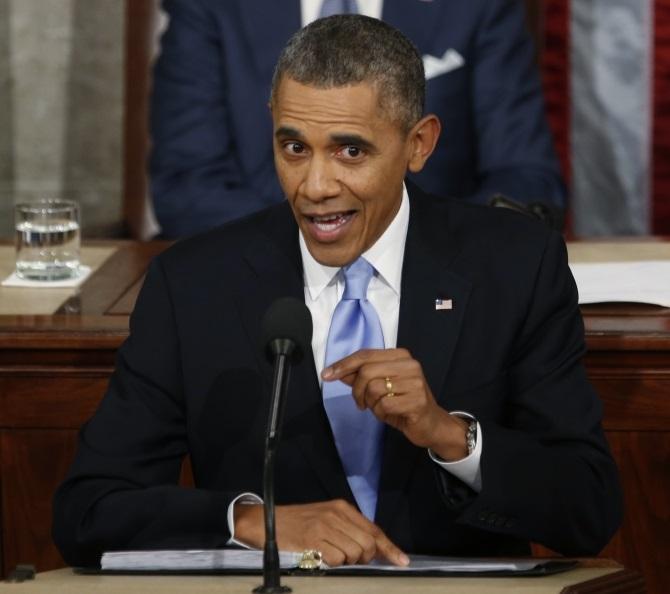
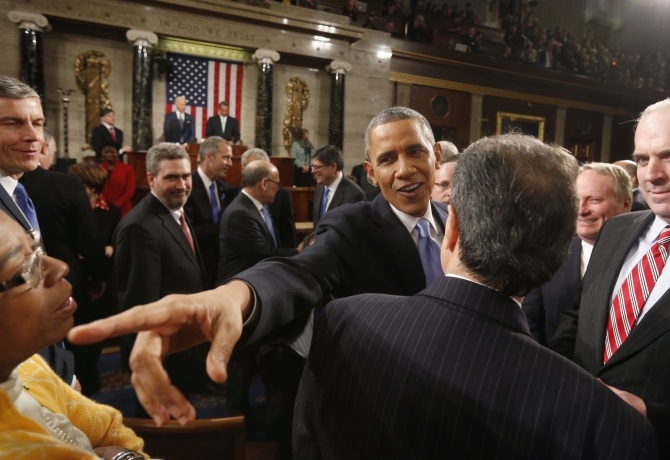
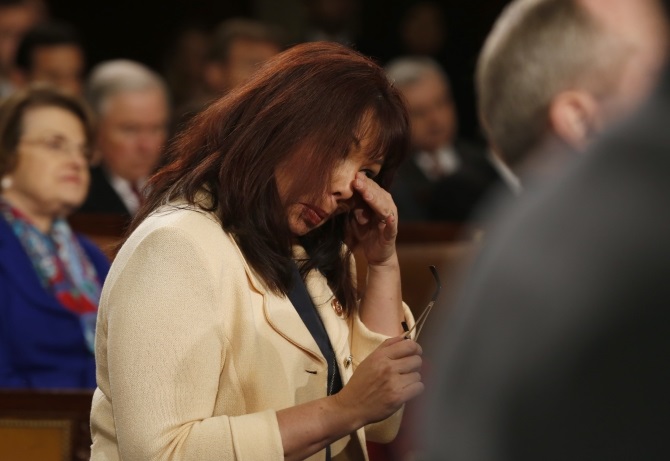
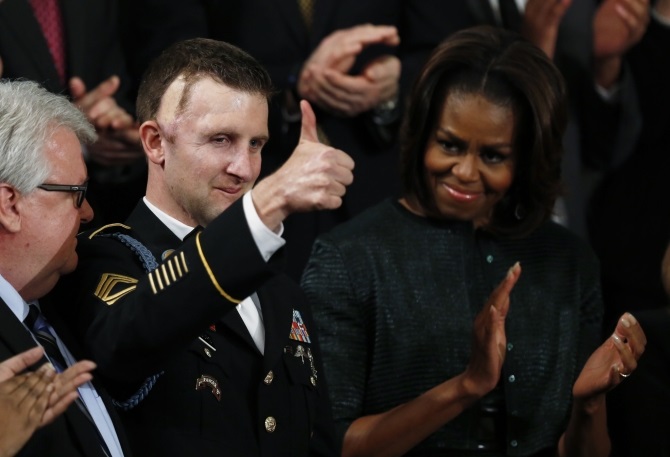
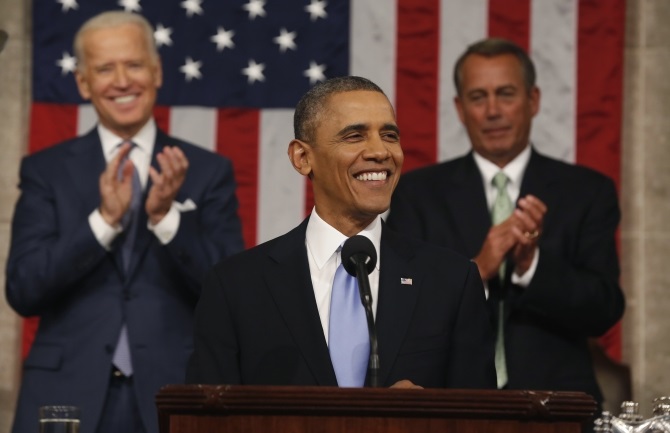
article